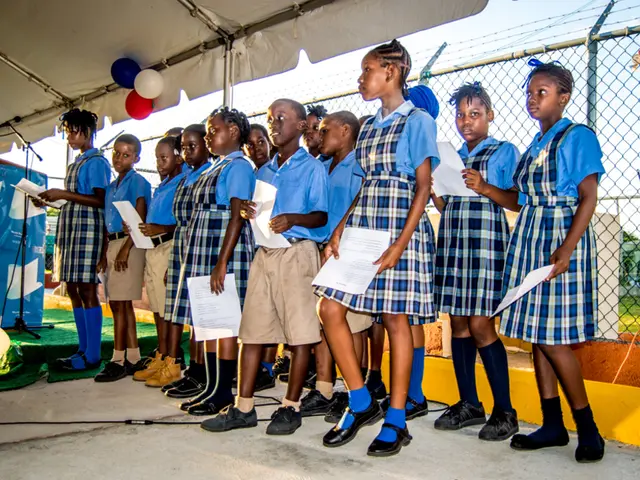Harvard foreign students faced restrictions; Trump justifies the action
U.S. Court Halts Administration's Move to Bar Foreign Students at Harvard
The Trump administration's decision to block foreign students at Harvard University has been temporarily halted by a federal judge, following a lawsuit filed by the institution.
On Sunday, President Donald Trump defended the controversial move, which he claimed was due to Harvard's alleged failure to disclose that nearly 31% of its students hail from foreign lands. The university, however, labeled the action as unlawful.
In a post on his Truth Social platform, Trump expressed his displeasure, stating that the countries from which these foreign students come, some not friendly towards the United States, do not contribute financially towards their education. He also accused Harvard of being less than forthcoming with this information, considering the significant funding the U.S. provides to the institution.
On May 22, Homeland Security Secretary Kristi Noem revoked Harvard's ability to enroll foreign nationals, casting doubt on the future of thousands of students and the lucrative income they bring to the university. This move was quickly suspended by a judge, following the university's lawsuit to "stop the government’s arbitrary, capricious, unlawful, and unconstitutional action."
The administration's actions against Harvard form part of a broader dispute, with the White House taking several steps to crack down on U.S. universities. These actions are justified as a reaction to alleged uncontrolled anti-Semitism and the need to reverse diversity programs aimed at addressing historical oppression of minorities.
The administration has also threatened to review $9 billion of funding at Harvard and targeted a Harvard Medical School researcher for deportation. The absence of foreign students, accounting for over a quarter of Harvard's student body, could prove costly to the institution, given the high tuition fees charged.
Harvard University, the wealthiest U.S. university with an endowment valued at $53.2 billion in 2024, filed a lawsuit alleging that the administration's actions were undisguised retaliation and arbitrary executive actions.
The federal court's temporary restraining order allows Harvard to continue hosting international students and scholars until a hearing decides the long-term fate of the Student and Exchange Visitor Program (SEVP) certification, which was revoked by the administration.
The ongoing legal battle between Harvard and the Trump administration could have significant implications for the educational institution, potentially impacting its academic programs, research collaborations, and overall reputation as a global academic leader.
- Despite the ongoing legal battle, policy-and-legislation in regards to online-education and education-and-self-development might face further scrutiny due to the dispute between Harvard University and the Trump administration.
- As politics and war-and-conflicts continue to shape policy-and-legislation, general-news outlets should closely monitor the court hearings regarding the temporary halt on the ban for foreign students at Harvard, as their fate could set a precedent for other universities offering online-education.
- Learning opportunities for students worldwide, as well as the revenue generated from international students' tuition at institutions like Harvard, are at stake in the unravelling saga of politics, policy-and-legislation, and the future of education-and-self-development in the United States.








